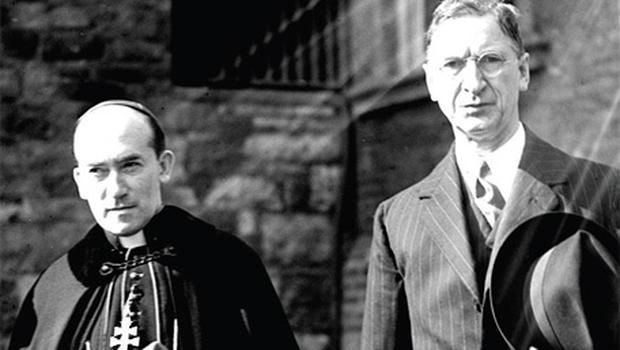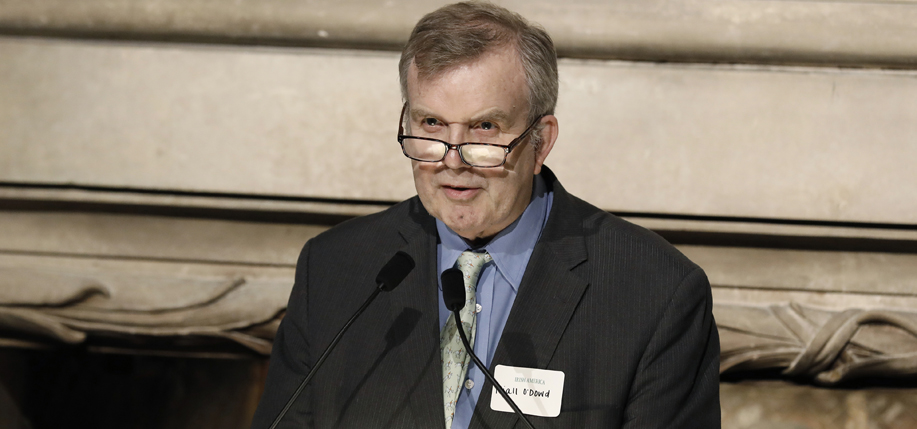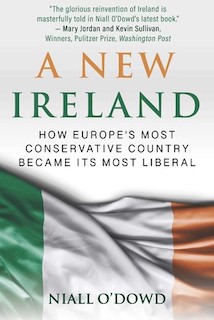Article 45.4.2 The State shall endeavour to ensure that the inadequate strength of women and the tender age of children shall not be abused, and that women or children shall not be forced by economic necessity to enter avocations unsuited to their sex, age or strength.
From the 1937 Irish Constitution
“In the Name of the Most Holy Trinity and of our Lord Jesus Christ, the Universal King, we the people of Ireland, so full of gratitude to God, who has so mercifully preserved us from innumerable dangers in the past; hereby, as a united independent Christian Nation, establish this Sovereign Society of the Irish people … and so in accordance with the principles laid down, we freely and deliberately to the glory of God and honour of Ireland, sanction this constitution and decree and enact as follows.”
THE preamble to the Irish constitution reads like a devout prayer and in many ways it was. It was the vision of two men joined together in orthodox catholicity of the most severe form. It trapped Ireland in a hidebound narrow and insular vision, which finally only let go in the new century.
There was no doubt that the affairs of the new state were utterly entwined with the church.
The Irish Catholic newspaper had reason to celebrate. “Irish Catholics will rejoice in the fact that the fundamental principles of the new Bunreacht [Constitution] are in close accord with Catholic social teaching.”
As for McQuaid, biographer John Cooney wrote, “McQuaid could proclaim ”Catholic Ireland, I am Catholic Ireland,” the Irish equivalent of Louis XIV’s alleged statement that “L’etat c’est moi.”
McQuaid, son of a doctor and a mother who died of post childbirth complications when he was only a week old, was born in Cavan in 1895. He did not find out until his teen years that his stepmother was not his biological mother. In that respect, he and de Valera had unusual relationships with their mothers. De Valera never knew his own mother either as she sent him back to Ireland, from the U.S. as a child.

McQuaid was a fire and brimstone cleric who was convinced Satan was at work in Ireland. He said so in his first major homily on Passion Sunday 1932 at a mass in his home county of Cavan.
“It is in truth a favorite device of Satan to weaken reverence for the authority of those who command in the name of Christ.”
Local Anglo Celt newspaper reported him as saying, “Thee conspiracy was led by Jews, Freemasons, Protestants, and Communists.”
Jews were especially malevolent “A Jew, as a Jew, is utterly opposed to Jesus Christ and all the church means.”
Jews he noted, “deliberately revolted against Our Divine Lord. Have chosen Satan as their head.”
Next up for banishment were the revolutionaries. The French Revolution was excoriated.
The Declaration of the Rights of Man (written by French revolutionaries with the aid of Thomas Jefferson) is the political creed that explains the modern world. Modern parliaments and laws are instruments for putting its theories into effect.
He continued: “Modern newspapers and cinemas are ‘the direct outcome of this virulent document which after the manner of Satan sets man in the place of God.’”
His Cavan homily was his tabula rasam his empty vessel into which he poured his lifelong convictions.
He was grossly anti-Semitic “Modern movies such as “Ben Hur,” “King of Kings,” and “The Ten Commandments” were showcases to show Christ as only a great man (not divine) and a member of the Jewish race!
He addressed how to stem the flow of modern malevolence flooding the world. He excoriated anything that did not put God at the center.
He demanded the Church control the schools in the independent Ireland. They successfully did so by ensuring that the local parish priest had the final word in all issues for primary schools and that every school in Ireland would have religious instruction at the center of the school day.
McQuaid also set out to refute the modern notion that the church should stay out of politics. “Priests must interfere in politics by Divine Right, to guide the faithful.”
That final point became the McQuaid’s modus operandi. For fifty years, in lockstep with de Valera, McQuaid would control politics in daily life in Ireland to an incredible degree. It was an astounding reality which plunged Ireland into the realm of a reactionary state, determined to root itself in the pre-modernist past, rather than look to the future.
A clause in the 1937 Constitution, which recognized the special position of the Catholic Church in Ireland, was McQuaid’s shining achievement. He was President of Blackrock College by then, three years away from being named Archbishop of Dublin, and he forged a resolute friendship with the former Blackrock pupil and teacher Eamon de Valera.
Apart from insuring a special position for his Church in the Constitution, the controversial article on “women knowing their place at home” was also McQuaid’s according to biographer John Cooney. He had long detested women’s efforts to gain power and felt women were weak and belonged at home.
The framers even set up a clause covering the “inadequate strength of women.” For de Valera, who showed little concern for women’s issues, and the outright misogynistic McQuaid, it was a triumphant moment.
The relevant language ran:
Article 41.2.1: In particular, the State recognises that by her life within the home, woman gives to the State a support without which the common good cannot be achieved.
Article 41.2.2: The State shall, therefore, endeavour to ensure that mothers shall not be obliged by economic necessity to engage in labour to the neglect of their duties in the home.
Article 45.4.1: The State pledges itself to safeguard with especial care the economic interests of the weaker sections of the community, and, where necessary, to contribute to the support of the infirm, the widow, the orphan, and the aged.
Article 45.4.2: The State shall endeavour to ensure that the inadequate strength of women and the tender age of children shall not be abused, and that women or children shall not be forced by economic necessity to enter avocations unsuited to their sex, age or strength.
Article 42: 5 states the state shall “endeavor to ensure that mothers shall not be obliged to engage in labor to the neglect of their duties within the home.
The Constitution, at McQuaid’s urging, included a ban on divorce and abortion and would have included a ban on contraception devices, if a law had not already been passed in 1935.
McQuaid liked to intimidate women and soon made clear the depths he was prepared to sink to.
His ability to snuff out any mention or thoughts of their sexuality reached their zenith (or nadir) in March 1944 when the Irish bishops came together at Easter to express disapproval of the sale of Tampax, a new sanitary item. McQuaid personally brought his complaints to the deputy minister for health and laid bare his fears that young girls could be stimulated by inserting the tampons, which would lead them to display their passions. Incredible to say, but the government agreed and Tampax was banned for a time!
McQuaid had also led a crusade, before he became Archbishop, as President of Blackrock College to deny young women the right to play sports.
In 1934 the Irish Times received a scalding letter entitled “Women in Athletics Protest from Blackrock College.”
McQuaid was appalled, yes appalled, that women’s athletics was taking place at the same time and the same places as men’s events.
McQuaid quoted the pope to back up his assertion that the Christian modesty of girls must be in a special way safeguarded for it is “surely unbecoming that they should flaunt and display themselves before the eyes of all.” Most newspapers endorsed his view.
De Valera and the other Irish party leaders were completely on board with McQuaid’s ferocious Jansenism. There was not a single voice in opposition, it seemed.
But there was a flickering ember when a brave, undaunted group of women who remembered the role women played in the Easter 1916 Rising, when Cumann na mBan, essentially the female IRA, fought bravely, side by side, with their fellow revolutionaries. They cast their minds back to the Easter Proclamation, unique in the world, because it included women as equals in its very opening line with its call to “Irishmen and Irish women.”
But the erosion of women’s rights since the Rising was clear. In 1927 they were essentially thrown off juries. In 1935 importation of any form of contraception was banned.
In an article entitled “A ‘Sinister and Retrogressive’ Proposal: Irish Women’s Opposition to the 1937 Draft Constitution,” author Maria Luddy, wrote that a brave statement from Cumann na mBan noted that:
This constitution does not satisfy the aspirations of the Irish people. If the Proclamation of Easter Week meant anything, it meant the end of capitalism and the introduction of equal rights and opportunities for all. Our charter of freedom was laid down in the proclamation of Easter week. Only the establishment of a republic in accordance with that proclamation will satisfy our aspirations.
Luddy writes that on publication of the draft constitution, many women were deeply concerned:
On 1 July the Joint Committee of Women’s Societies and Social Workers wrote to de Valera concerning “women’s constitutional and economic condition.” …
It took the Joint Committee from July 1936 to 29 January I937 to arrange a delegation to meet with de Valera on this issue of representation.
A departmental memo, summing up his response to the meeting, noted:
The president pointed out that any inadequacy in the representation of women in the legislature and public bodies was attributable to the state of public opinion. It would be difficult to do anything to give women a larger role in public life, while public opinion remains as it is.
A prominent female columnist in the Irish Independent, Gertrude Gaffney, made quite a fuss when she attacked de Valera’s constitution draft.
The “death knell of the working woman is sounded in this new constitution,” she wrote. “Mr. de Valera has always been a reactionary where women are concerned. He dislikes and distrusts us as a sex and his aim ever since he came into office has been to put us into what he considers is our place and keep us there.”
Under the proposed constitution, Gaffney argued, “we are no longer citizens entitled to enjoy equal rights under a democratic constitution, but laws are to be enacted which will take into consideration our ‘differences of capacity, physical and moral, and of social function.”
De Valera made clear he could care less. McQuaid warned him about “Godless feminism” and assured him women were being treated exactly as they should be. In addition, de Valera’s very own newspaper, The Irish Press, slammed Gaffney and told her to stick to her knitting and let her betters decide.
De Valera cared far more for church approval. In the ultimate act of submission, he even had the Irish Constitution draft sent to the pope himself for his benediction. De Valera did so, in part because McQuaid was pushing too strongly, even in de Valera’s opinion, on forcing a Catholic not an Irish Constitution through.
His thinking was if the pope agreed with the draft then McQuaid would too. The pope refused to give his imprimatur, but the Constitution was voted through with McQuaid’s fingerprints all over it. On the 29th of December 1937, the Constitution was approved. Ireland was officially the most ferociously Catholic state on earth.
 Niall is the co-founder of Irish America magazine as well as the founder of the Irish Voice Newspaper and Irishcentral.com and publishes Home and Away, a successful weekly freesheet. He was awarded an honorary doctorate by University College Dublin for his work on the Irish peace process which was a subject of a book Daring Diplomacy and a PBS Special An Irish Voice.
Niall is the co-founder of Irish America magazine as well as the founder of the Irish Voice Newspaper and Irishcentral.com and publishes Home and Away, a successful weekly freesheet. He was awarded an honorary doctorate by University College Dublin for his work on the Irish peace process which was a subject of a book Daring Diplomacy and a PBS Special An Irish Voice.


When we think off. History in Ireland what. Are we to think, At the drafting off the Constitution . The
Irish Government should never have been involved with the Church. The Church should not have
Been involved in any way with the Constitution the rights off Women were not respected in any way
And that held in this Country up until the 1960, First line off the Constitution Freedom Irish men and
Irish Women in the latter where was there Freedom, As we all now know Woman and their Children e
Up in Homes Provided by the State some never came out